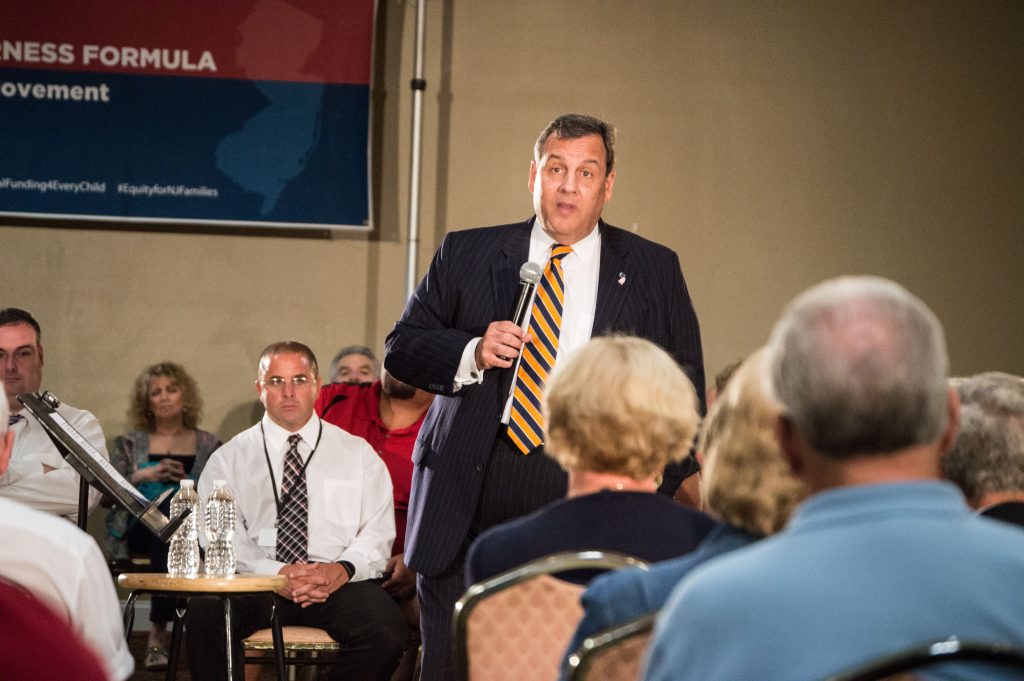
Gov. Chris Christie addresses local residents at a forum in Bayville, Sept. 15, 2016. (Photo: Daniel Nee)
Gov. Chris Christie did not mince words during a visit to Ocean County on Thursday: high property taxes driven by a lack of school funding are pricing residents out of New Jersey’s suburban communities.
The governor, in Bayville to promote his Fair School Funding proposal – which would equalize financial aid at $6,599 per student, statewide – also announced legal action to overturn what he termed “unconstitutional” state statutes and labor agreements that “interfered with New Jersey’s maintenance of a thorough and efficient system of free public schools.”
The action, which was filed with the state Supreme Court on Thursday, reopens the Abbott v. Burke case which established the current funding formula, under which 31 urban school districts receive the lion’s share of the $9.4 billion New Jersey spends on education each year, leaving the remaining 546 school districts to divide up what remains.
|
|
The legal action does not specifically target the formula, but instead challenges practices required under state statutes and union contracts, including the “last-in, first-out” philosophy, under which layoffs of teachers are determined by the length of the employee’s service to a district.
Also targeted, Christie said, are contractual clauses such as one in Camden which states that a teacher can only be required to perform instruction for four-and-a-half hours of a seven hour workday.
Additionally, the filing seeks to hold state funding for the former Abbott districts at current levels, while the legislative and executive branches enact a new system for funding education that is “fair and constitutionally sound.”
Christie said the three decades-long practice of sending billions of dollars in state aid to the poor, urban districts have given rise to the state’s highest-in-the-nation property taxes – since local taxpayers in suburban districts have to make up for a lack of state aid – without producing positive results in the districts the extra funding is intended to help.
“In that 30 years, you and I, the taxpayers of the state of New Jersey, have sent $98 billion to those 31 districts,” said Christie. “All the other school districts in the state have received $80 billion.”
Graduation rates in many of the former Abbott districts are in the range of 60 percent, he said, and 27 of the 31 districts are below state average.
“It says that this experiment has failed,” Christie said of the graduation rates. “I’ve decided today that I’m not going to just sit on the sidelines and have these forums.
In the Brick Township school district, equal funding would amount to $28.1 million in property tax relief, state figures show. But while districts such as Brick would benefit from additional state aid, critics charge that urban districts would suffer if they were to lose the billions in state aid which they currently receive.
Christie brushed off such criticism, instead blaming a “tragic” system for the failure of urban districts to perform.
“The real thing that’s preventing us from teaching kids in these districts are the ridiculous work rules that are imposed upon us by statute and collective bargaining agreements from the teachers’ unions,” Christie told a packed room at the Bayville Elks Lodge. “How is it that in Camden, one of the worst school districts in the state, the union contract requires only four hours, forty-five minutes of instruction for every seven and a half hour day the teachers put in? It’s these kind of bargaining agreements and work rules that we are stuck with in this state.”
“I’ve tried negotiating with the legislature, I’ve tried negotiating with the teachers’ union,” Christie continued. “For the first time, it’s your governor going to court on behalf of the people of this state. We’re fighting for you, instead of educational institutions going to court with their hand out, fighting for your money.”
The governor argued his plan would benefit both urban and suburban students.
“I want urban education to get better in this state. I want those families to have better opportunity. I also want your families to be able to live here,” he said, addressing the Ocean County crowd. “I don’t want you to leave New Jersey because your property taxes are so high you can’t afford to stay here.”
Christie took questions from the audience, further discussing the plan and taking a moment to spar with a retired teacher who said she believes Christie should have tempered his remarks by touting the state’s high national rankings for education, which are at or near the best in the United States.
The New Jersey Education Association, the union which represents the bulk of the state’s teachers, expectedly came out against Christie’s proposals.
“[Christie] will not succeed in destroying what the people of New Jersey have worked for so many years to build together,” a statement from NJEA President Wendell Steinhauer said. “We will defend the integrity of our public schools, the interests of our students and the rights of our members against this cravenly political ploy.”
Steinhauser predicted efforts to reform the funding formula would fail.
“[Christie] tried this strategy before in a 2010 challenge to the Abbott decision and it was rejected by the court,” he said. “This is not a legal strategy. It’s a political ploy.”
Supporters of the plan have said that equalizing school funding could help prevent teacher layoffs and stave off benefits give-backs in suburban districts. Many Ocean County districts, including Brick, Toms River and Lacey townships, laid off teachers before the 2016-17 school year began, citing concerns over funding and rising tax rates.
“I am the worst thing that has ever happened to the teachers union in this state because for the first time, someone is telling the truth,” Christie said, to applause.

Advertisement

Police, Fire & Courts
Teacher From Brick, 36, Charged With Carrying on Affair With Student
Brick Life
Adult Autism Transition

Police, Fire & Courts
Teacher From Brick Charged in Another Sex Affair With Student









